Modular synth layout repository
|
In the interest of not hijacking another thread, here are a few layouts for some modules I've found interesting. Please excuse any odd wire links, standing resistors, ideosyncracies, etc. I hadn't planned on anyone else seeing/using these.
First up, two unique LFOs. The first is a voltage controlled LFO originally used in the Moog Source (schematic). 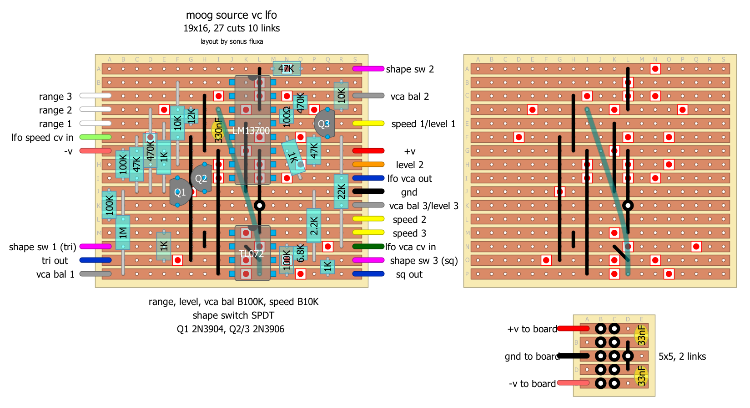 The second is an LFO with a bunch of different shapes and a max 60 second cycle, designed by Tim Servo (schematics; this layout follows the block diagram in the bottom right corner of the middle schematic). Using a log pot on the coarse rate is important, otherwise its a pain to dial in a moderate speed (trust me, I only had linear on hand 😔). 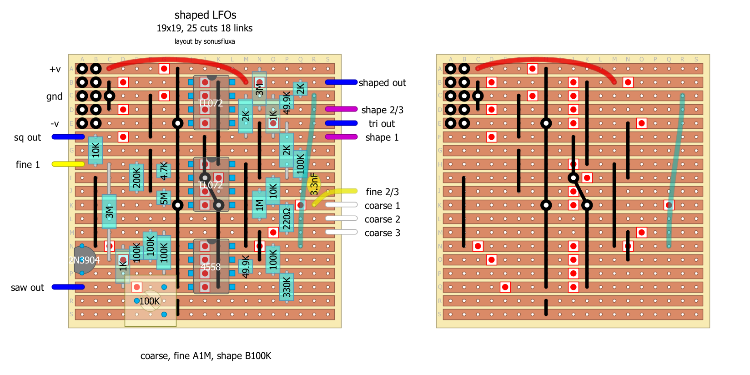 Power supply on these two is optimized for eurorack, but can be finagled to run off of a +/- daughter board. As always, happy to answer questions to the best of my ability, and will post a few more if there's interest. |
Re: Modular synth layout repository
|
I'd love to see more! I am also building a modular synth, but my design is using lunetta circuits almost entirely. I can contribute a few layouts I have made. A number of these are re-designs of Castle Rocktronics perfboard modules with PCB design as well. There's more info on my blog http://ello.co/dianus
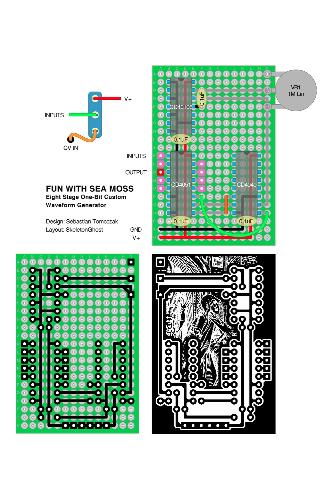 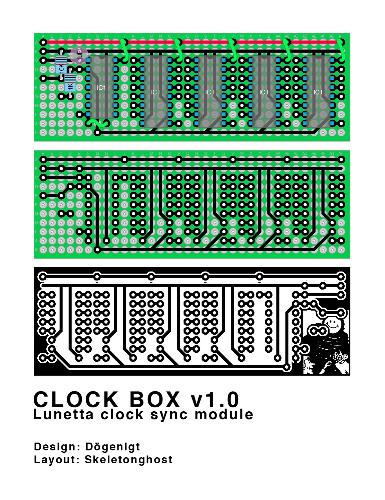 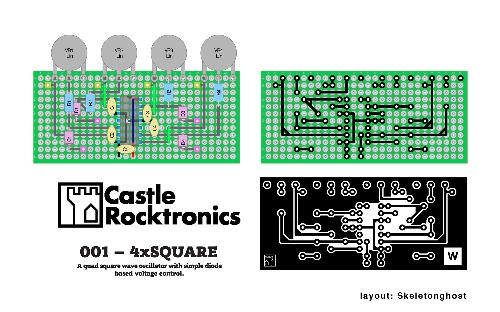 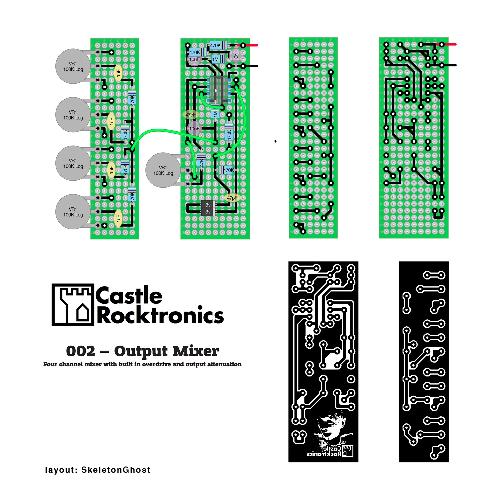 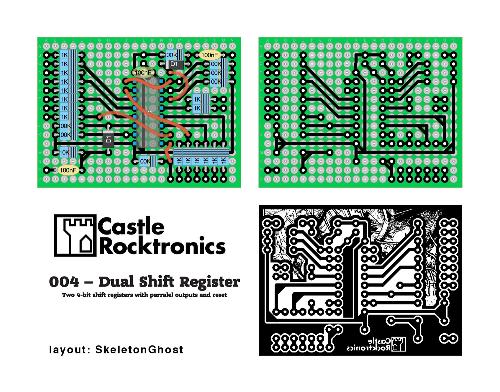 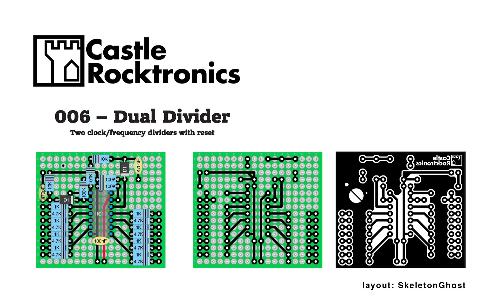
|
|
In reply to this post by SonusFluxa
Ready for a noobquestion? :D
I, like most, have always been intrigued by modular synths, but find it vey intimidating. From what I read it it's quite the investment to start with. On the other hand: A lot of pedalcompanies are having a go at it, so I'm guessing the transition for effects modules vs pedals is not such a big one? Is it possible to build something modular from vero modules, or are there key-modules that can't be done? And have it running at 9v. Or is this just plain stupid? :D |
Re: Modular synth layout repository
|
Skeletonghost, these are awesome layouts! Really love the artwork filling in the pcbs, I'm gonna have to etch a couple of those.
Marbles, I highly recommend checking out castle rocktonics. As I've mentioned elsewhere on the forum, I've built a full rack of synth modules running off of a 9v power supply typically used for pedals. The module and distribution system is the design of castle rocktonics. Typically, I've noticed that the power supply and case are the first hurdles that people have to jump over, and the page I've linked to alleviates at least the power portion. As far as other modules, people have already posted a few filters on here (ms-20 and wasp) that are usually considered synth modules, and Neil has posted his layouts for the baby 8 and vanishing point sequencers. I've posted a VCO somewhere on here, which I'll post again when I'm on the device with all of my layouts if that makes things easier. It can definitely be done on vero, as long as we accept that we probably aren't going to be getting super insane digital modules that are all surface mount components. Even then, it's definitely possible to build something capable of sounding musical or building interesting soundscapes. For me, it mainly comes down to how large the vero board will be, and if i feel like the time it takes to lay it out and what I'll learn in the process are worth the effort (and i usually find they are). This has already ended up longer than I intended, but I hope it's helpful, and hope it removes some of the intimidation factor! I've still got a handful of vero layouts to post in here, just had some busy times in the past weeks. Hope those will help also. And if you need any info on cases, I'd recommend checking this out, if only to give you some ideas. |
|
It's very helpful!
Thanks so much. I did see your project before and thought it looked awesome. Apologies for the hijacking. But yes, those hurdles are exactly it, and soundscapes are what I'm after. Don't mistake my short answer for a lack of appreciation, I've got some reading to do, thanks! |
Re: Modular synth layout repository
|
SonusFluxa that is an excellent and detailed answer. I'd only add a couple of things. One distinction that is what most musicians are referring to when they discuss "modular synths" are eurorack compatible systems. They are typically designed for -12v/12v power supply and may not be easily compatible with some DIY stuff posted here.
I would research Lunetta synths, which is a kind of modular synth, but designed to use low voltage DC and simple through hole CMOS logic chips. It's the easiest and cheapest style of modular synth to get into imo. The forum on electro-music is an amazing resource. I think vero-board modules are great if you can find them, but in my experience most modular synth resources simply provide a schematic or if you're lucky a perfboard design. I had designed a few modules on perf but I've decided recently to upgrade them to PCB. There are quite a few expenses even if you are going the entirely DIY approach. One hurdle was designing panels to fit a 3U rack (more complicated then expected!) I eventually laser cut them out of acrylic. All the jacks, pots, and cables really add up in price as well. It's definitely not a cheap hobby to get into! That said it's super satisfying making all sorts of bleeps and bloops. And in the process of building and designing modules I have learned a great deal about electronic theory and logic. I used to have a pedal addiction but now I am a certified synth-head. I've attached a picture of the current state of my system (partially disassembled to replace the perf with PCBs) 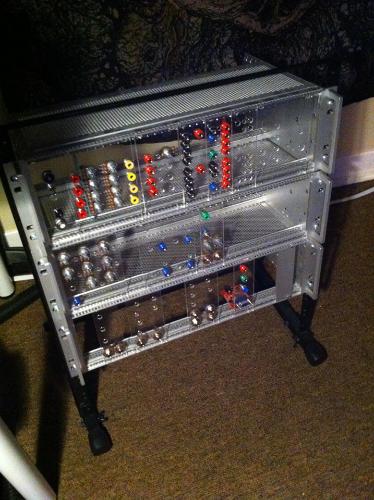
|
Re: Modular synth layout repository
|
reviving a 6 year old thread here.....
curious if anyone has ever built any of those layouts sonusfluxa? from a guitar background and have built tons of layouts for pedals. and now on a modular journey. ive built a psu, EG and LFO on stripboard. really love to do more! |
«
Return to Unverified Layouts
|
1 view|%1 views
| Free forum by Nabble | Edit this page |

